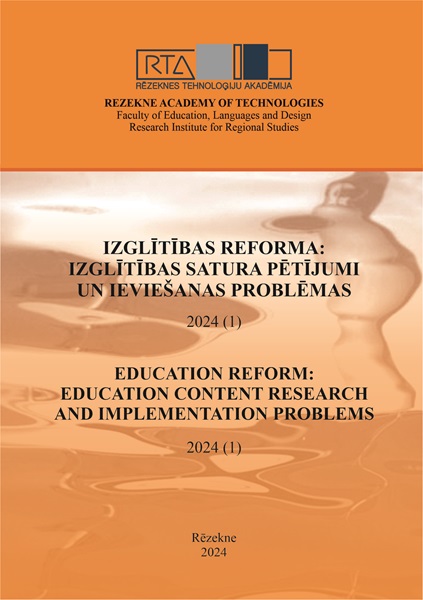LEADERSHIP OF 5-6 YEAR OLD CHILDREN AND ITS ASSESSMENT CRITERIA
DOI:
https://doi.org/10.17770/er2024.1.7931Keywords:
leadership assessment criteria, leadership skills, leadership development, pre-schoolAbstract
The research aim is analyze theoretical literature to ascertain the relevance of leadership skills of 5-6-year-old children and leadership assessment criteria. When comparing and analyzing the information provided in various studies, the leadership abilities of adults and educators are more often emphasized. The content of competence education reveals how important it is to develop leadership skills in preschool children. During the research, it was concluded that the leadership skills of adults are equivalent to the typical skills of 5-6-year-old children, which develop at this age. Several of these skills are learned by integrating cross-cutting skills into the pedagogical process. As a result of the theoretical analysis, six leadership evaluation criteria and 4 levels of 5-6-year-old children were identified. Children who have developed their leadership skills are more successful in the next stages of education. According to the summary of the results, it can be concluded that every 5-6-year-old child possesses leadership skills to a greater or lesser extent, it is important to notice these skills in time and continue further development based on children's strengths.
References
Adair, J. E. (2007). Develop your leadership skills, Vol. 37. Kogan Page Publishers. Retrieved from: https://grabebook.files.wordpress.com/2011/12/develop-your-leadership-skills.pdf
Ali, M. (2022). Innovative Leadership Management in Early Children Education. Jurnal Obsesi: Jurnal Pendidikan Anak Usia Dini, 6(4), 3007-3012. DOI: https://doi.org/10.31004/obsesi.v6i4.2198
Abdurahimovna, B. Z. (2023). Launching the organizational activity of the director of preschool education organizations. Open Access Repository, 4(3), 1024-1030. Retrieved from https://www.oarepo.org/index.php/oa/article/view/1407/1399
Douglass, A. L. (2019). Leadership for quality early childhood education and care. DOI: https://doi.org/10.1787/6e563bae-en
Dzintere, D., Stangaine, I. & Augstkalne, D. (2014). Bērna komunikatīvās kompetences attīstība. Rīga: RaKa
Ebert, S. (2020). Theory of mind, language, and reading: Developmental relations from early childhood to early adolescence. Journal of experimental child psychology, 191, 104739. DOI: 10.1016/j.jecp.2019.104739
Geske, A., & Rečs, N. (2019). The Impact of Headmaster’s Leadership Practice on the Formation of a Professional Learning Community at School. In Society. Integration. Education. Proceedings of the International Scientific Conference (Vol. 2, pp. 90-105). DOI: https://doi.org/10.17770/sie2019vol2.3816
Hafsari, A. S. (2020). Te influence of the transformational leadership of kindergarten heads, job satisfaction, work spirit of work on the performance of kindergarten teachers in the Pelangi Cluster, South Banjarmasin District. Journal of K6 Education and Management, 3(4), 486–495. Retrieved from: https://j-k6em.org/index.php/jkemorg/ article/view/420/110
Kovač, V., & Staničić, S. (2019). Educational leadership in the republic of Croatia. Leadership in education, 61. Retrieved from: https://pefja.kg.ac.rs/wp-content/uploads/2019/12/4-Vesna-Kova%C4%8D-and-Stjepan-Stani%C4%8Di%C4%87-EDUCATIONAL-LEADERSHIP-IN-THE-REPUBLIC-OF-CROATIA.pdf
Latvija2030 (2010) Latvijas ilgtspējīgas attīstības stratēģija līdz 2030. gadam. Pieejams: https://www.mk.gov.lv/lv/latvijas-ilgtspejigas-attistibas-strategija?utm_source=https%3A%2F%2Fwww.google.com%2F
Liu, Z., Venkatesh, S., Murphy, S. E., & Riggio, R. E. (2021). Leader development across the lifespan: A dynamic experiences-grounded approach. The Leadership Quarterly, 32(5), 101382. DOI: https://doi.org/10.1016/j.leaqua.2020.101382
MK noteikumi (2018). Noteikumi par valsts pirmsskolas izglītības vadlīnijām un pirmsskolas izglītības programmu paraugiem. Pieejams: https://likumi.lv/ta/id/303371-noteikumi-par-valsts-pirmsskolas-izglitibas-vadlinijam-un-pirmsskolas-izglitibas-programmu-paraugiem
Mlinarevic, V., Tokic Zec, R., & Cvjeticanin, A. (2022). A model of transformational leadership in the organisational culture of preschool institution. CEPS Journal, 12(3), 103-126. DOI: 10.25656/01:25502
Munby, S. (2020). The development of school leadership practices for 21st century schools. European Journal of Education, 55(2), 146-150. DOI: 10.1111/ejed.12394
Nong, L., Ye, J. H., & Hong, J. C. (2022). The impact of empowering leadership on preschool teachers’ job well-being in the context of COVID-19: A perspective based on job demands-resources model. Frontiers in Psychology, 13, 895664. DOI: https://doi.org/10.3389/fpsyg.2022.895664
Özbey, S. A. İ. D. E., & Köyceğiz, M. (2020). A study on the effect of the social skill education on the academic self respect and problem solving skills of the pre-school children. International e-Journal of Educational Studies, 4(8), 176-189. DOI: 10.31458/iejes.727590
Pakalniņa, R., Ročāne, M., & Jurs, P. (2023, July). The relevance of transformational leadership in the context of the competence approach in pre-school. Society. Integration. Education. Vol. 2, 89-99. DOI: 10.17770/sie2023vol2.7140
Rogers, K. B. (2007). Lessons learned about educating the gifted and talented: A synthesis of the research on educational practice. Gifted child quarterly, 51(4), 382-396. DOI: 10.1177/0016986207306324
Skola2030 (n.g.). Pirmskolas izglītības programma. Pieejams: https://mape.skola2030.lv/ resources/10.
Šmite, A. & Soboļeva, Z. (1997). Palīgs pedagogam, Rīga: RaKa.
Tauriņa, A. (2015). Bērna jautājumi - personības izaugsmes pamats. No Bērna sasniegumu veicināšana pirmsskolā (90-91). Rīga: RaKa
Turani, D., & Bloem, S. (2019), “The TALIS Starting Strong Survey: implications for the leadership discourse in early childhood education and care”, in Strehmel, P. (ed.), Leadership in Early Education in Times of Change, Robert Bosch Foundation, Opladen. Retrieved from: https://pdfhost.io/v/n8NGaseZCI_Leadership_in_Early_Education_ in_Times_of_Change
Vigule, D. (2015). Gribas īpašību veidošanās pirmsskolā. No Bērna sasniegumu veicināšana pirmsskolā (214-215). Rīga: RaKa
Winston, B. E., & Patterson, K. (2006). An integrative definition of leadership. International journal of leadership studies, 1(2), 6-66. Retrieved from: https://www.rodrigo selback.com.br/wp-content/uploads/2020/08/An-Integrative-Definition-of-Leader ship.pdf






